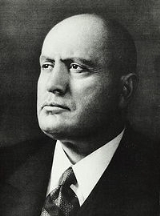
and is credited with being one of the key figures in the creation of Fascism.
Mussolini became the 40th Prime Minister of Italy
in 1922 and began using the title Il Duce
by 1925. After 1936, his official title was Sua Eccellenza Benito Mussolini, Capo del Governo, Duce del Fascismo e Fondatore dell'Impero ("His Excellency Benito Mussolini, Head of Government, Duce of Fascism, and Founder of the Empire") Mussolini also created and held the supreme military rank of First Marshal of the Empire
along with King Victor Emmanuel III of Italy
, which gave him and the King joint supreme control over the military of Italy.
The national flag is a rag that should be placed in a dunghill.![]()
Let us have a dagger between our teeth, a bomb in our hands and an infinite scorn in our hearts.![]()
The Fascist accepts life and loves it, knowing nothing of and despising suicide; he rather conceives of life as duty and struggle and conquest, life which should be high and full, lived for oneself, but not above all for others — those who are at hand and those who are far distant, contemporaries, and those who will come after.![]()
Speeches made to the people are essential to the arousing of enthusiasm for a war.![]()
I owe most to Georges Sorel|Georges Sorel. This master of syndicalism by his rough theories of revolutionary tactics has contributed most to form the discipline, energy and power of the fascist cohorts.![]()
Three cheers for the war. Three cheers for Italy's war and three cheers for war in general. Peace is hence absurd or rather a pause in war.![]()
I don't like the look of him.![]()

